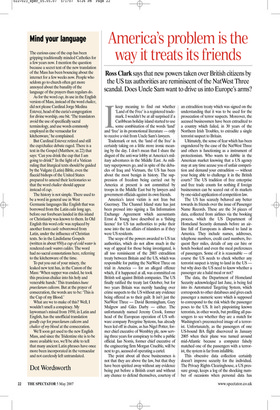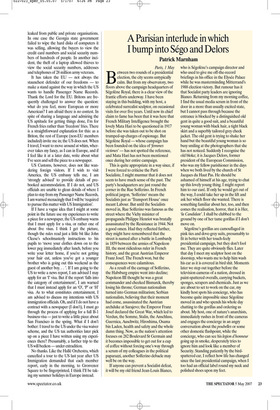America’s problem is the way it treats its friends
Ross Clark says that new powers taken over British citizens by the US tax authorities are reminiscent of the NatWest Three scandal. Does Uncle Sam want to drive us into Europe’s arms?
Ikeep meaning to find out whether ‘Land of the Free’ is a registered trademark. I wouldn’t be at all surprised if a Caribbean holiday island started to use some combination of the words ‘land’ and ‘free’ in its promotional literature — only to receive a visit from Uncle Sam’s lawyers.
Trademark or not, the ‘land of the free’ is certainly taking on a little more ironic meaning by the day. I don’t mean that I share the disgust of the anti-war lobby at America’s military adventures in the Middle East. As military superpowers go, and in spite of the debacles of Iraq and Vietnam, the US has been about the most benign in history. The suppression of freedom being carried out by America at present is not committed by troops in the Middle East but by lawyers and government officials against its own friends.
America’s latest victim is not Iran but Guernsey. The Channel Island state has just been pressed into signing a Tax Information Exchange Agreement which accountants Ernst & Young have described as a ‘fishing licence’ for US tax authorities to poke their nose into the tax affairs of islanders as if they were US residents.
The scope of the powers awarded to US tax authorities, which do not allow much in the way of appeal for those being investigated, is all too reminiscent of the 2003 extradition treaty between Britain and the US, which was responsible for putting the NatWest Three on trial in America — for an alleged offence which, if it happened at all, was committed on British soil against British companies. The US finally ratified the treaty last October, but for two years Britain was merrily handing over crime suspects to the US without any evidence being offered as to their guilt. It isn’t just the NatWest Three — David Bermingham, Gary Mulgrew and Giles Darby — either. The unfortunately named Jeremy Crook, former head of the European operation of US software company Peregrine Systems, has already been led off in chains, as has Nigel Potter, former chief executive of Wembley plc, now serving three years for conspiracy to bribe a public official. Ian Norris, former chief executive of the engineering firm Morgan Crucible, will be next to go, accused of operating a cartel.
The point about all these businessmen is not that they are above the law, but that they have been spirited away without any evidence being put before a British court and without any chance to defend themselves, courtesy of an extradition treaty which was signed on the understanding that it was to be used for the prosecution of terror suspects. Moreover, the accused businessmen have been extradited to a country which failed, in 30 years of the Northern Irish Troubles, to extradite a single terrorist suspect to Britain.
Ultimately, the sense of fear which has been engendered by the case of the NatWest Three and others is functioning as a instrument of protectionism. Who wants to dabble in the American market knowing that a US agency may at any time accuse you of unfair competition and demand your extradition — without your being able to challenge it in the British courts? The US tradition of free enterprise and free trade counts for nothing if foreign businessmen can be scared out of its markets by one-sided application of competition law.
The US has scarcely behaved any better towards its friends over the issue of Passenger Name Records. These are the 34 pieces of data, collected from airlines via the booking process, which the US Department of Homeland Security demands before an airline full of Europeans is allowed to land in America. They include names, addresses, telephone numbers, credit card numbers, frequent flyer miles, details of any car hire or hotels booked and even the meal preferences of passengers. Some of it is reasonable — of course the US needs to check whether any terrorist suspect is trying to land in the US but why does the US need to know whether a passenger ate a halal meal or not?
The data, the Department of Homeland Security acknowledged last June, is being fed into its Automated Targeting System, which corresponds to other databases and gives each passenger a numeric score which is supposed to correspond to the risk which the passenger poses to the US. It isn’t pinpointing known terrorists, in other words, but profiling all passengers to see whether they are a match for Washington’s preconceived image of a terrorist. Unfortunately, as the passengers of one US-bound BA flight discovered in January 2005 when their plane was turned around mid-Atlantic because a computer falsely matched one of the passengers with a terrorist, the system is far from infallible.
This obsessive data collection certainly doesn’t improve security for the individual. The Privacy Rights Clearinghouse, a US pressure group, keeps a log of the shocking number of occasions when personal data has leaked from public and private organisations. In one case the Georgia state government failed to wipe the hard disks of computers it was selling, allowing the buyers to view the credit card numbers and social security numbers of hundreds of people. In another incident, the theft of a laptop allowed thieves to view the social security numbers, addresses and telephones of 28 million army veterans.
It has taken the EU — not always the staunchest defender of our freedoms — to make a stand against the way in which the US wants to handle Passenger Name Records. Thank the Lord for the EU. Britons are frequently challenged to answer the question: what do you feel, more European or more American? I am afraid there is no contest. In spite of sharing a language and admiring the US aptitude for getting things done, I’m for French fries rather than ‘freedom’ fries. There is a straightforward explanation for this: as a Briton, the rest of Europe (non-EU members included) invite me in; the US does not. When I travel, I want to move around at whim, wherever takes my fancy, as I can in Europe, and if I feel like it at a later date, write about what I’ve seen and sell the piece to a newspaper.
US Customs, however, does not like wandering foreign visitors. If I wish to visit America, the US embassy tells me, I am ‘strongly advised’ to provide details of prebooked accommodation. If I do not, and US officials are unable to glean details of where I plan to stay from my Passenger Name Records, I am warned menacingly that I will be ‘required to pursue this matter with US Immigration’.
If I have a vague idea that I might at some point in the future use my experiences to write a piece for a newspaper, the US embassy warns that I must apply for a visa, or rather one of about five visas. I think I get the picture, though the rules read just a little bit like John Cleese’s schoolmasterly instructions to his pupils to ‘move your clothes down on to the lower peg immediately after lunch, before you write your letter home, if you’re not getting your hair cut, unless you’ve got a younger brother who is going out this weekend as the guest of another boy... ’. If I am going to the US to write a news report, I am advised I may apply for an ‘I’ visa. But if the report ‘falls into the category of entertainment’, I am warned that I must instead apply for an ‘O’, ‘P’ or ‘H’ visa. As to what constitutes entertainment, I am advised to discuss my intentions with US immigration officials. Oh, and if I do not have a contract with a newspaper (I don’t), I must go through the process of applying for a full B-1 business visa — just to write a little piece about San Francisco in the spring. What if I don’t bother: I travel to the US under the visa waiver scheme, and the US tax authorities later pick up on a piece I have written using my experiences there? Presumably, a further trip to the US will beckon — under extradition.
No thanks. Like the Hallé Orchestra, which cancelled a tour to the US last year after US Immigration demanded that each member report, early in the morning, to Grosvenor Square to be fingerprinted, I think I’ll be taking my summer holidays in Europe instead.



































































































 Previous page
Previous page